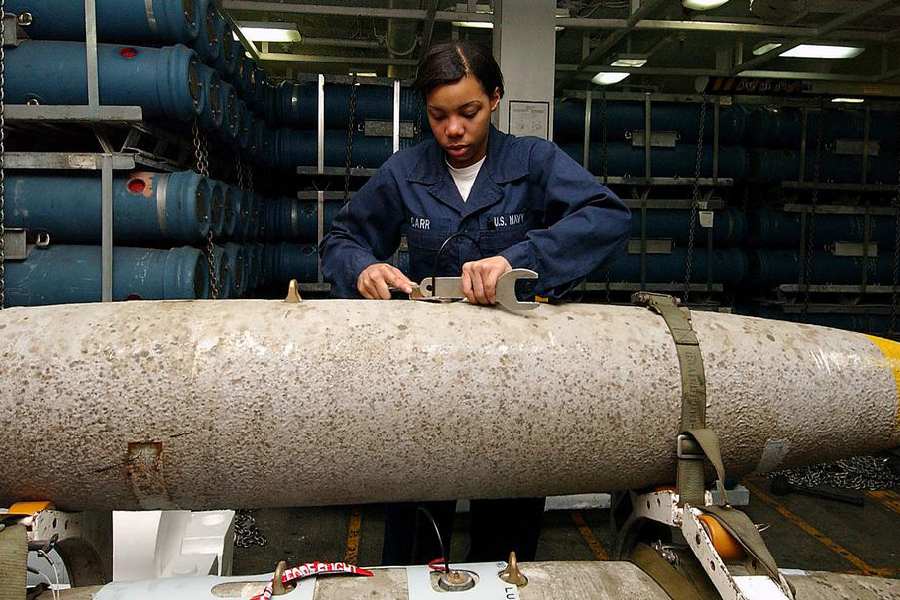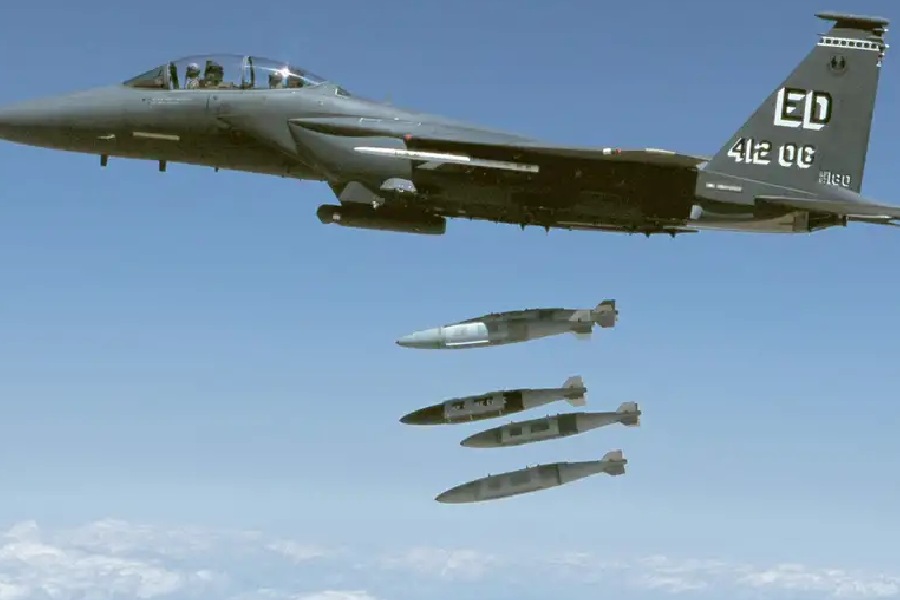The US has been Israel's foremost arms supplier for decades. According to the Stockholm International Peace Research Institute (SIPRI) 99% of arms imports for Israel between 2019 and 2023 came from the US (69%) and Germany (30%).
Before Hamas-led attack in Israel on October 7, 2023, Washington was exporting arms worth an average of $3 billion (€2.76 billion) per year to Israel. In absolute terms, however, Israel imports fewer arms from the US than other countries in the region.
Over the past five years, Israel has received 3.6% of US arms exports, while 15% have gone to Saudi Arabia, 8.2% to Qatar and 4.5% to Kuwait.
US fighter jets are playing an important role in Israel's massive military offensive in Gaza, as well as in strikes against Hezbollah in southern Lebanon. According to a report by SIPRI, the US supplied thousands of guided weapons and missiles to Israel at the end of 2023. But the overall volume of Israeli arms imports was not significantly higher in 2023 than it was the previous year.

The MK-84 bomb can cause massive destruction to concrete and metal structures across a wide radius, making it unsuited for urban warfare Deutsche Welle
Steady flow of arms supplies
The supply of heavy weaponry to Israel has been particularly contested this year, with protesters taking to the streets and blocking supply lines in an effort to halt military shipments.
In May, US president Joe Biden temporarily suspended the delivery of 2,000-pound (907 kilograms) and 500-pound bombs after expressing concern over the high number of civilian deaths in Gaza and the conduct of the Israeli Defense Forces (IDF), which have been accused of human rights abuses against Palestinians in Gaza and the occupied West Bank.
According to the Ministry of Health in Gaza, the death toll in the besieged enclave has exceeded 39,000 since Israel began its military campaign last year in response to the October 7 attacks. Nearly 2 million people, almost the entire population, have been displaced, and some 8,000 children suffer from malnutrition due to an ongoing blockade that UN experts are saying have cause famine to spread across the entire Gaza Strip.
After it was announced that the supply of 500-pound bombs to Israeli forces would be resumed, a US official told the Reuters news agency anonymously that the "main concern had been and remains the potential use of 2,000-pound bombs in Rafah and elsewhere in Gaza."
In Rafah, Israeli airstrikes and shellings killed scores of refugees sheltering in the city, prompting the International Court of Justice to order Israel to "immediately halt its military offensive or any other action in the Rafah governorate."
Even though the US suspended its supply of heavy bombs for a few weeks, this has not stopped the steady flow of US weapons across the Atlantic. In a report last month, Reuters said that the US had "transferred at least 14,000 of the MK-84 2,000-pound bombs, 6,500 500-pound bombs, 3,000 Hellfire precision-guided air-to-ground missiles, 1,000 bunker-buster bombs, 2,600 air-dropped small-diameter bombs, and other munitions" between the start of the war in Gaza last October and the end of June.
The 2,000-pound MK-84 bomb is one of the largest conventional free-fall or unguided bombs in the US arsenal. It is filled with more than more than 945 pounds (429 kilos) of highly explosive material and can cause massive destruction to concrete and metal structures. The bomb is often used against heavily fortified targets or underground bunkers.
Its use in densely populated areas is particularly problematic due to the large blast radius and high destructive power.
Germany supplies weapons of war and defence equipment
Last year, the German government authorized arms exports worth a total of €326.5 ($355.3 million) to Israel. Of this amount, €20 million was earmarked for weapons of war while the remaining €306.3 million was reserved for defense equipment.
According to media reports, the supplies include 3,000 portable anti-tank weapons, 500,000 rounds of ammunition for fully and semi-automatic firearms as well as other fuses and propellants. Much of the over €300 million was spent on armored vehicles, military trucks and safety glass.
Until the fall of 2023, only €38.5 million worth of military exports to Israel had been approved in Germany. That figure rose sharply after October 7.
In November, the Federal Office for Economic Affairs and Export Control, which overseas arms exports, stated that as a consequence of the attack, "applications for the export of military equipment to Israel" would be decided upon according to priority. The share of weapons of war amounts to nearly 6% of the total volume — in 2022, it was 2%.
As a result of the significant increase in arms exports from Germany to Israel, the latter now ranks seventh among the prime recipients of Germany military technology. Ukraine tops the list, receiving over €4 billion worth, while Norway and Hungary fall in second and third place respectively, both receiving over €1 billion.

German Chancellor Olaf Scholz (l) visited Israel and Prime Minister Benjamin Netanyahu in March 2024 Deutsche Welle
Activists and Palestinians sue German government
German supplies of arms to Israel has been repeated criticized. Earlier this year, the European Center for Constitutional and Human Rights (ECCHR) filed a lawsuit against the German government with a local Berlin court in an attempt to stop arms exports to Israel.
The ECCHR filed its suit alongside five Palestinians in Gaza whose relatives were killed by Israeli rocket attacks. In June, the court rejected the case on the grounds that the German government had complied with the law and international obligations at the time it had authorized the exports.











